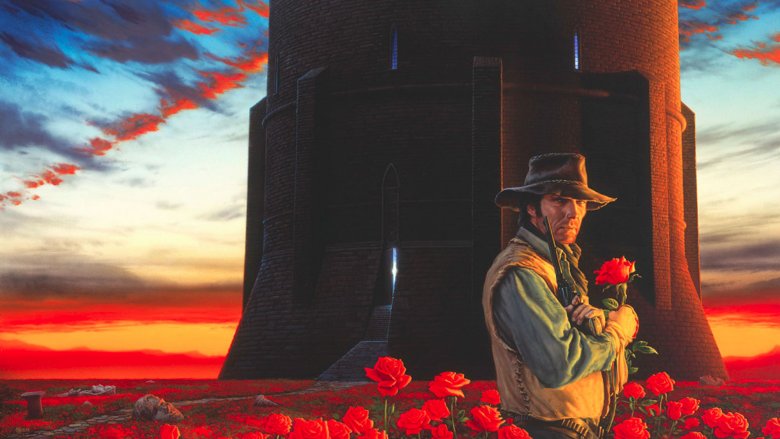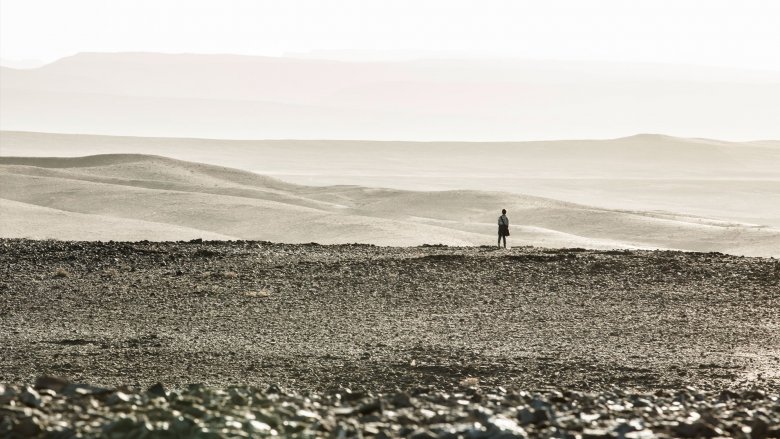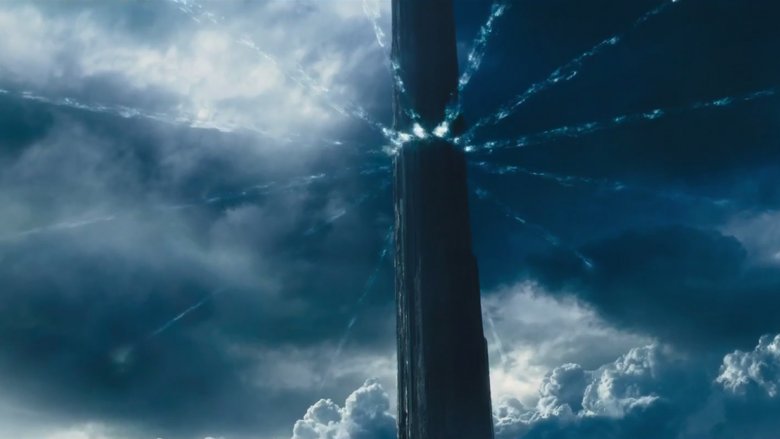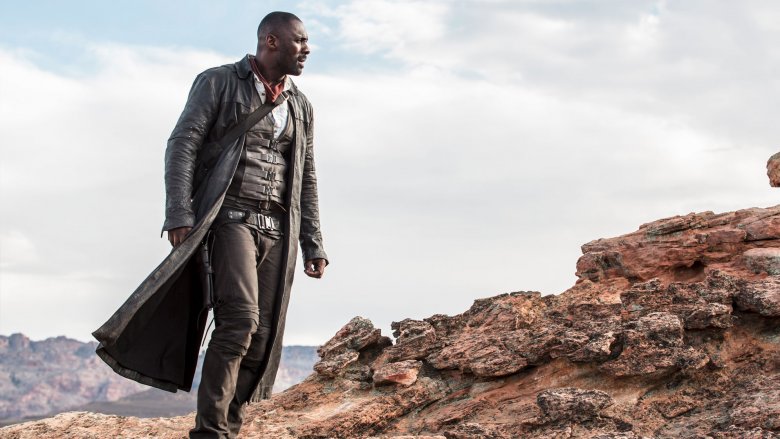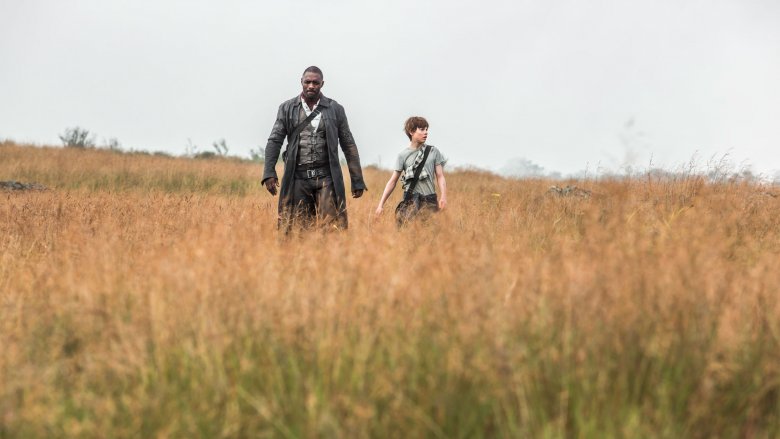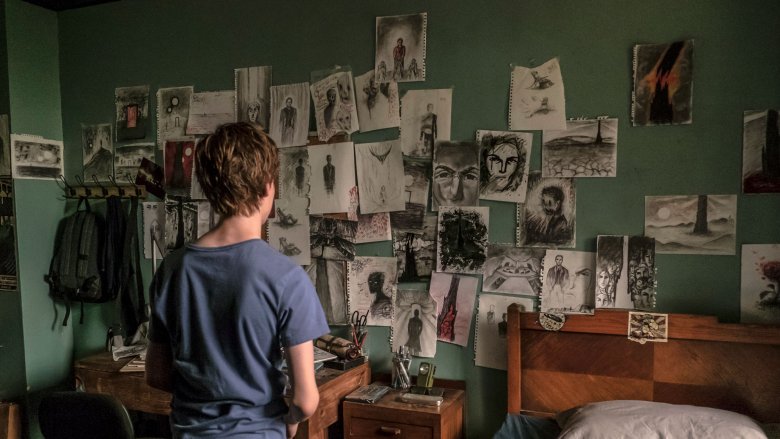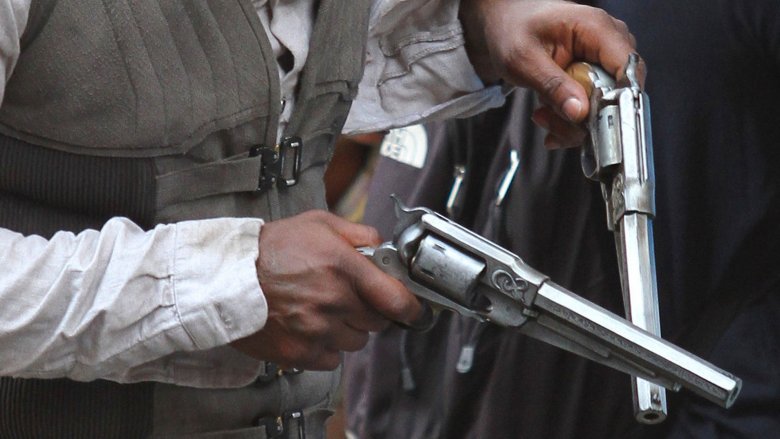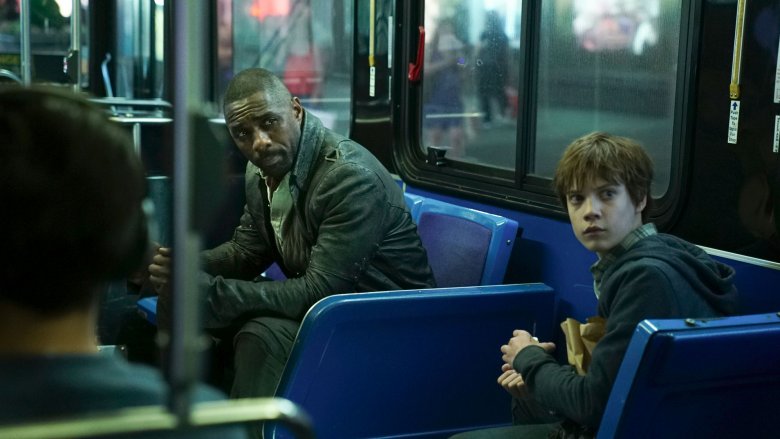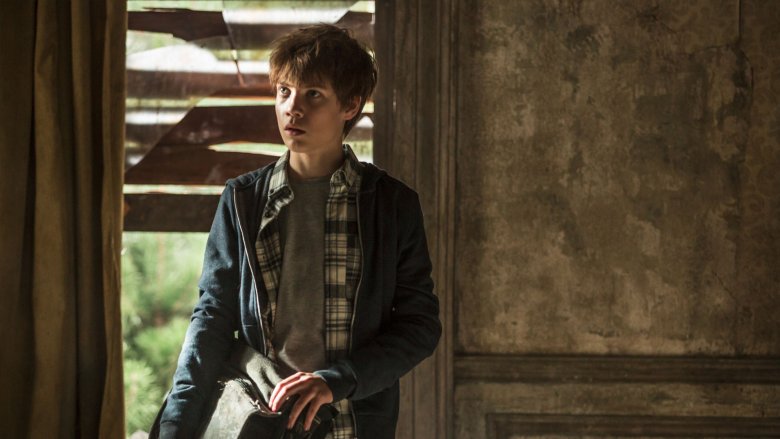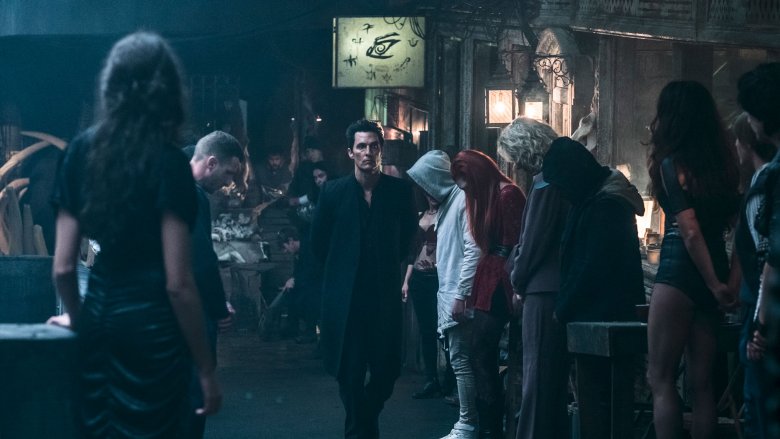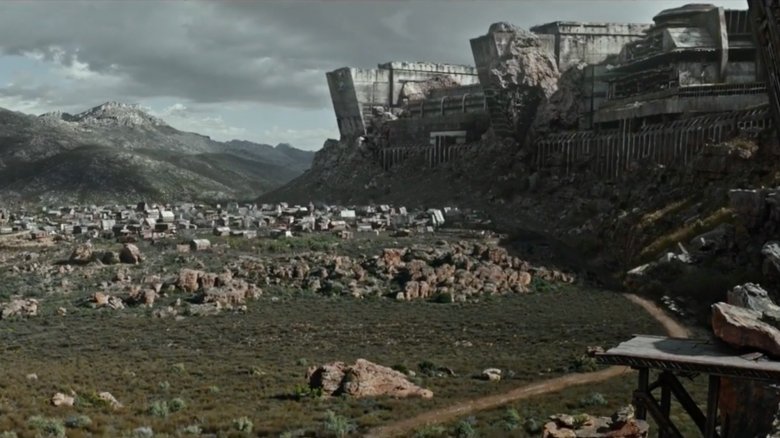The Untold Truth Of The Dark Tower
Now that we've seen the official trailer for The Dark Tower movie, it finally seems real—Stephen King's sprawling fantasy saga is finally making it to the big screen. Whether you're a longtime fan or a new arrival in Mid-World, join us as we take a look at some of the little-known history behind this epic series before it arrives in theaters on August 4, 2017.
The Prisoner and The Lady of Shadows
Fans cried foul early in the casting process for the movie when it became apparent that two major characters from The Dark Tower series—Eddie and Susannah—wouldn't be in the film. Director Nikolaj Arcel and Stephen King confirmed in July 2016 to Entertainment Weekly that these two fan favorites are being left out—for now. Arcel felt it was important to establish main character Roland Deschain's "lone wolf" nature before introducing the rest of his companions. "They're certainly out there," Arcel mused. "I think the entire story deserves to be told and should be told. I would certainly be disappointed in myself or my collaborators if we didn't bring them in. They're such a huge part of the story."
Development Hell
Efforts to adapt the Dark Tower books into a movie or television series went on for at least a decade. King revealed in 2007 that Carlton Cuse and Damon Lindelof, who worked on Lost with J.J. Abrams. had optioned the film rights from him for a mere $19, a significant number that appears throughout the series. Unfortunately, that adaptation never made it off the ground and the effort was abandoned by late 2009.
Next, celebrated director Ron Howard got his hands on The Dark Tower, along with writer Akiva Goldsman, for a proposed multi-film and television series deal with Universal, and they even got as far as casting Javier Bardem as Roland. Universal decided to drop the deal in 2011 over budgetary concerns, leaving the Dark Tower on the verge of crumbling yet again. Howard and Goldsman never gave up on the project, however, and in 2015 Sony announced it was picking up the project, with Howard producing and Nikolaj Arcel taking over as director.
The Tower at the center of it all
If you're familiar with Stephen King's work beyond The Dark Tower series, you've probably noticed some of the major connections between it and his other books—such as the appearance of Father Callahan from Salem's Lot. Callahan is only the tip of the iceberg, however. As King explained in the afterword to the fourth book, Wizard and Glass, "I have written enough novels and short stories to fill a solar system of the imagination, but Roland's story is my Jupiter—a planet that dwarfs all the others...I think there's more to it than that, actually. I am coming to understand that Roland's world (or worlds) actually contains all the others of my making."
The Dark Tower is King's magnum opus, with hundreds of obvious and subtle connections and references to the rest of his literary works. He's created a page on his website to help document all the connections—even the ones he may not have realized were there when he wrote them.
It's not all black and white
When writing The Gunslinger, King was heavily inspired by the spaghetti westerns of the '60s and '70s, particularly those starring Clint Eastwood as the Man With No Name. The May 2017 trailer for The Dark Tower even features Ennio Morricone's music box theme from For a Few Dollars More. Roland Deschain started out as a knight errant—much like the one found in Sergio Leone's movies—with "blue bombardier's eyes." Because of the clear description of Roland in the books—and the racial tension between the white Roland and Susannah, who is black—many fans were surprised, and some were even angered by the casting of Idris Elba in the role. King himself shot down the protests, however: "For me the character is still the character...He can be white or black, it makes no difference to me. I think it opens all kind of exciting possibilities for the backstory."
A long journey
Stephen King started the first book in the series, The Gunslinger, in 1970, when he was still in college. It took 12 years for The Gunslinger to be published in its entirety, and it would take three more decades for the rest of the books in the "main" series to be written and published. King has always been transfixed by the world of Roland, but it's never been easy for him to write about. In a note from third installment The Waste Lands, he explains, "finding the doors to Roland's world has never been easy for me and it takes more and more whittling to make each successive key fit each successive lock...it holds me in its thrall." The last book from Roland's world, The Wind Through The Keyhole, was published 42 years after he started writing The Gunslinger back in 1970—and King has dropped plenty of clues that he's not done yet.
Upcoming TV series
Not only will we be getting a movie about Roland Deschain, but Sony and production company MRC announced in September 2016 that they've greenlighted a 10-13 episode season of a Dark Tower series. While they don't have a distributor lined up yet, production is moving forward, with filming scheduled to start in 2017 and a premiere date expected sometime in 2018. According to Sony and MRC, the television series will tell Roland's "origin story," focusing on the teenage years written about by King in the novel Wizard and Glass. Because of the different ages, it seems likely that we'll see a younger actor play the part of Roland for the show.
The Horn of Eld
Many fans worried about the current Dark Tower movie project because of how far it seemed to stray from the books—but one seemingly minor change will actually make all the difference in the world. A May 2016 tweet from King revealed that Roland has the Horn of Eld in the movie adaptation, and later photos from the movie set confirm Roland is carrying the Horn. We won't spoil the meaning of the Horn for non-readers, but it's extremely significant; if you want a more in-depth look at why, check out this article.
What it all means is that the movie actually takes place after the material written in the novels, a development that's been confirmed by the director. Naturally, this is exciting for readers, because it means that we don't have to worry about the movie staying faithful to the source material—they're free to take the story wherever they will (which makes the exclusion of Eddie and Susannah from the movie a lot more palatable).
Childe Roland
While writing The Dark Tower novels, King drew heavily on poetic works by two classic authors—T.S. Eliot and Robert Browning. T.S. Eliot's poem The Waste Land is heavily referenced throughout the series, especially in the third book, The Waste Lands. Images of a broken and disjointed world are pulled from Eliot's work, and inspire the landscape of Mid-World found within King's novels.
Browning's poem Childe Roland to the Dark Tower Came was the impetus for the series, including the main character's name and his quest. King told the Castle Rock News in 1989, "Browning never says what that tower is, but it's based on an even older tradition about Childe Roland that's lost in antiquity. Nobody knows who wrote it, and nobody knows what the Dark Tower is. So I started off wondering: What is this tower? What does it mean? And I decided that everybody keeps a Dark Tower in their heart that they want to find. They know it's destructive and it will probably mean the end of them, but there's that urge to make it your own or to destroy it, one or the other."
Editing, schmediting
King has always considered the published Dark Tower series to be a first draft, as none of the books were ever edited beyond basic spell checking and formatting. After he was hit by a car in 1999 while walking near his home in Maine, King considerably accelerated his pace; the last three books in the main series were all released within a year of each other, and King made the odd choice to include himself (the author) as a character.
Looking back at that decision, King told fellow author Neil Gaiman in 2012 that he was thinking of going back and rewriting the entire series, and possibly even taking himself out of the last three books—an idea he repeated to Rolling Stone in a 2014 interview. "The thing about The Dark Tower is that those books were never edited, so I look at them as first drafts. And by the time I got to the fifth or sixth book, I'm thinking to myself, 'This is really all one novel.' It drives me crazy. The thing is to try to find the time to rewrite them."
Bright green paper
Would you believe that King's most epic work was made possible because of some strange paper? During his senior year in college, he was gifted a ream—in a non-standard size and colored brightly green—by Tabitha Spruce, the woman who would later become his wife. In the afterword to the 1982 edition of The Gunslinger, King explained how that paper changed his life forever. "[It] was bright green, nearly as thick as cardboard, and of an extremely eccentric size – about seven inches wide by about ten inches long, as I recall. I was at that time living in a scuzzy riverside cabin not far from the University, and I was living all by myself—the first third of the foregoing tale was written in a ghastly, unbroken silence. Those two factors, the challenge of that blank green paper, and the utter silence...were more responsible than anything else for the opening lay of The Dark Tower."
More stories left to write
Despite the difficulties he's had writing about the world of the Dark Tower, King keeps coming back, and dropping hints that he's not done. Long after the "main" books in the series were completed in 2004, King published The Wind Through the Keyhole in 2012, a story within a story which also takes place in Roland's world. In 2014, he admitted there's still more he wants to write: "There's a missing element—a big battle at a place called Jericho Hill. And that whole thing should be written, and I've thought about it several times, and I don't know how to get into it." We can only hope King will manages to find his way back to Roland's world soon.
